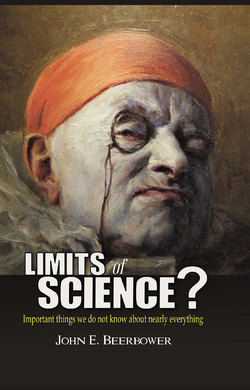Читать книгу Limits of Science? - John E. Beerbower - Страница 39
На сайте Литреса книга снята с продажи.
Wigner’s famous question
ОглавлениеThe question is often asked why it is that we find that many branches of mathematics have real world applications. Nobel-prize winning physicist Eugene P. Wigner gave a famous lecture in 1959 entitled “The Unreasonable Effectiveness of Mathematics in the Natural Sciences,” Communications of Pure and Applied Mathematics, Vol. XIII (1960), pp.1–14. The title seems to have captured the philosophical puzzle in an imaginative way, since the lecture is frequently cited, and there are numerous articles published utilizing easily recognizable variations on Wigner’s title. I do not intend below to discuss all of the matters illuminated in that lecture, but I simply note here that Wigner did not, in my view, present a very satisfactory answer to the question he asked. Yet, many scientists since have limited their discussion of the issue to a citation to that lecture, as if it held the dispositive answer.6
Of course, as already suggested, it may be a mistake to talk about mathematics as if it were all the same thing epistemologically. One might observe that arithmetic, at least in its simple form, reflects one aspect of material things, captured in counting, addition and subtraction. Kant argued that arithmetic reflected the structure of time, based upon counting which takes place in time. Id., p.7. Geometry reflects the structure of space. Id. One might speculate that each of these branches of mathematics developed simply as an accurate representation of relationships that exist in various aspects of the real world. It is a curious fact, then, that algebra (derived from arithmetic) can be successfully applied to geometry and geometry to algebra, each being used to simplify or solve problems arising in the other. See id., pp.20–21.7 Perhaps, this applicability evidences some underlying logic in the nature of reality. However, as we have come to learn, Euclidean geometry is not in fact a totally accurate representation of space.
As we have noted, mathematics is essentially an elaborate exercise of human reasoning or logic. See, e.g, Wigner, “The Unreasonable Effectiveness,” at pp.2–3. The historians of science can debate, and maybe establish, the extent to which more sophisticated mathematics developed through an analysis of real world applications, such as counting things or describing the physical features of our three dimensional space, or as an independent, logical exercise that to the surprise of the creators has some real world application. Undoubtedly, there has been some of each. See, e.g., Kline, Mathematics, pp.30–7, 51–4; Wigner, “The Unreasonable Effectiveness,” pp.2–3.
In any event, the questions I want to highlight here are:
First, why is it that the phenomena in the physical world seem to be capable of description or modeling through mathematics; and
Second, could one conclude that any logically consistent mathematical model has a physical analog in some universe.
The underlying question, reworded, is why does human logic seem able to capture natural phenomena? (“Nature speaks in equations. It is an odd coincidence. The rules of mathematics were built around counting sheep and surveying property, yet these very rules govern the way the universe works.” Charles Seife, Zero: The Biography of a Dangerous Idea (2000), p.117.8
As previously noted, it might be suggested that mathematics and human reasoning are the results of evolution and that, as such, we would expect them to reflect reality. But, as also observed, such an argument would only apply to aspects of the world around us that have been directly relevant to our survival and reproduction. Modern science, and its mathematical models, go far, far beyond such matters, into realms of knowledge that have only recent or expected future relevance to our physical existence and other realms of knowledge that have no currently foreseeable material utility.
Indeed, Cambridge paleobiologist Simon Conway Morris has asserted that “being a product of evolution gives no warrant at all that what we perceive as rationality, and indeed one that science and mathematics employ with almost dizzying success, has as its basis anything more than sheer whimsy.” “Darwin was right. Up to a point,” The Guardian, 12 February 2009. For the reasons just expressed, I think that he overstates his case here. But, he goes on, suggesting an argument that many scientists strongly resist: “If, however, the universe is actually the product of a rational Mind and evolution is simply the search engine that in leading to sentience and consciousness allows us to discover the fundamental architecture of the universe—a point many mathematicians intuitively sense when they speak of The Unreasonable Effectiveness of mathematics—then things not only start to make much better sense, but they are also much more interesting.” Id.
